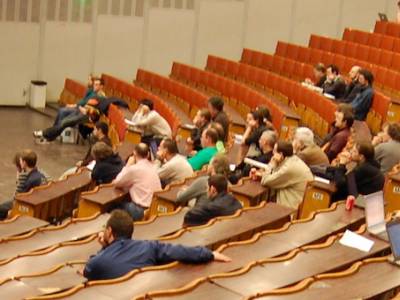Hello all--
I'm hoping to pursue a career in academia, namely becoming a professor of law or at the very least a professor at the collegiate level. Are there any future academics with a J.D. hoping to pursue an L.L.M. for purely academic purposes? If so, what are your thoughts on whether an L.L.M. would be helpful in this pursuit and which schools may be best. Thanks!
Future academics?
Posted Jul 21, 2009 20:42
I'm hoping to pursue a career in academia, namely becoming a professor of law or at the very least a professor at the collegiate level. Are there any future academics with a J.D. hoping to pursue an L.L.M. for purely academic purposes? If so, what are your thoughts on whether an L.L.M. would be helpful in this pursuit and which schools may be best. Thanks!
Posted Jul 21, 2009 22:32
Hi,
I'm a domestic lawyer with a JD from a US law school. I have the same interests you described - an academic career. My JD school, while respectable, is not among the top 10 law schools. In my opinion, doing an LLM may make sense if your academic background does not match the traditional profile of an academic - i.e., if your JD is not from one of the top 10 law schools. It gives you a chance to write and research as well as to show that you can compete at a top school. VAPs are good too if you can get one.
In my opinion, Yale is the top LLM for future academics. However, my understanding is that Yale accepts zero to one Americans in any given year, with only the truly exceptional applicants making the cut. For me, Harvard is a close second.
I'm a domestic lawyer with a JD from a US law school. I have the same interests you described - an academic career. My JD school, while respectable, is not among the top 10 law schools. In my opinion, doing an LLM may make sense if your academic background does not match the traditional profile of an academic - i.e., if your JD is not from one of the top 10 law schools. It gives you a chance to write and research as well as to show that you can compete at a top school. VAPs are good too if you can get one.
In my opinion, Yale is the top LLM for future academics. However, my understanding is that Yale accepts zero to one Americans in any given year, with only the truly exceptional applicants making the cut. For me, Harvard is a close second.
Posted Jul 22, 2009 01:21
Hi,
just curious, but my impression is that the LLM, JSD are degrees primarily aimed at foreign academics. Wouldn't you be better served by following the normal route undertaken by US academics, i.e. getting a phD in another subject together with your JD
just curious, but my impression is that the LLM, JSD are degrees primarily aimed at foreign academics. Wouldn't you be better served by following the normal route undertaken by US academics, i.e. getting a phD in another subject together with your JD
Posted Jul 22, 2009 15:53
First, thank you both for your responses! Second, I've found that a lot of programs are now accepting more and more U.S. students as the demand for specialized knowledge in fields like International Law, International Business Law, and Tax Law increases. I'm looking to pursue a career teaching legal theory, jurisprudence, or comparative law, and as you both may know, it's rather difficult if not impossible to gain practical experience in any of these fields. So I figured the best way to substitute the practical experience often demanded of law professors is to pursue an L.L.M. in the particular field I want to teach in. That said, I don't want to waste a year of time and money if I don't need to. Have any of you heard of anyone wanting to go into academia in this manner? If so, how did they go about accomplishing it?
Posted Jul 22, 2009 16:31
Hi,
I'm trying to pursue a career in legal theory as well. From what I know, most American universities - although there are exceptions - hire individuals with a phD in philosophy for their legal theory classes. It is much harder to get hired as a Professor if you do the LLM, JSD/PhD Law/ Dphil Law route although it is not unheard of. Non-american universities such as those in the UK are in general more receptive with regards to recruiting their legal philosohers through the LLM/JSD route. I personally have never heard of any recently hired professor with just a LLM, so I think that if one does the Law School route, one must be prepared to do a Law PhD as well.
For US philosophy programs, NYU is excellent from what I hear. There's a rather comprehensive ranking of US philosophy programs on the website "philosophical gourmet" run by University of Chicago Law and Philosophy Professor Brian Leiter.
I'm a non-american so I'm doing it via the law school route and if that's the route you want to take, I recommend the best program to do legal theory - at LLM level - is actually at a non-american institution (Oxford), if that's in your range. The BCL (oxford's LLM) is famous for producing legal theorists and has lots of theoretical subjects such as jurisprudence and philosophical foundations of the common law. Other good non-american law institutions where you can do a specialised LLM in Legal Theory are University College London, Toronto and Edinburgh. Besides the LLM, UCL also has a MA in Legal and Political Theory.
With regards to American Law Schools, there are a few which offer substantial legal theory courses besides Harvard and Yale. NYU Law again has a good program and they do accept a large domestic LLM group, they also have the former Professor of Jurisprudence at Oxford - Ronald Dworkin - on their teaching staff. Other notable legal philosophers on NYU's staff are Thomas Nagel and Jeremy Waldron. Besides NYU, Berkley has a special direct entry PhD program for intending legal theorists. Upenn also has an excellent Legal Philosophy faculty with Stephen Perry at the helm.
Hope that helps
I'm trying to pursue a career in legal theory as well. From what I know, most American universities - although there are exceptions - hire individuals with a phD in philosophy for their legal theory classes. It is much harder to get hired as a Professor if you do the LLM, JSD/PhD Law/ Dphil Law route although it is not unheard of. Non-american universities such as those in the UK are in general more receptive with regards to recruiting their legal philosohers through the LLM/JSD route. I personally have never heard of any recently hired professor with just a LLM, so I think that if one does the Law School route, one must be prepared to do a Law PhD as well.
For US philosophy programs, NYU is excellent from what I hear. There's a rather comprehensive ranking of US philosophy programs on the website "philosophical gourmet" run by University of Chicago Law and Philosophy Professor Brian Leiter.
I'm a non-american so I'm doing it via the law school route and if that's the route you want to take, I recommend the best program to do legal theory - at LLM level - is actually at a non-american institution (Oxford), if that's in your range. The BCL (oxford's LLM) is famous for producing legal theorists and has lots of theoretical subjects such as jurisprudence and philosophical foundations of the common law. Other good non-american law institutions where you can do a specialised LLM in Legal Theory are University College London, Toronto and Edinburgh. Besides the LLM, UCL also has a MA in Legal and Political Theory.
With regards to American Law Schools, there are a few which offer substantial legal theory courses besides Harvard and Yale. NYU Law again has a good program and they do accept a large domestic LLM group, they also have the former Professor of Jurisprudence at Oxford - Ronald Dworkin - on their teaching staff. Other notable legal philosophers on NYU's staff are Thomas Nagel and Jeremy Waldron. Besides NYU, Berkley has a special direct entry PhD program for intending legal theorists. Upenn also has an excellent Legal Philosophy faculty with Stephen Perry at the helm.
Hope that helps
Posted Jul 22, 2009 17:09
Thanks for your thoughts Interalia. In my experience, the "normal route" taken by U.S. academics is not the JD plus PhD route (although perhaps legal theory professors are an exception to this general rule). Overall, I think you'll find relatively few US law professors with a PhD. Rather, in my experience the "normal route" is a JD from a top 10 (preferably top 6) law school, a high-level federal clerkship, a few years in practice, and then a transition to academia. For those of us whose backgrounds don't exactly match that pattern, things are much more difficult, and it's all about amassing credentials - whether those credentials be work experience, PhD, LLM, or (perhaps most importantly) published articles in law journals.
Posted Jul 22, 2009 17:19
Have any of you heard of anyone wanting to go into academia in this manner? If so, how did they go about accomplishing it?
Yes, although I'm looking to go into academia in environmental law, as my professional background and experiences are in environmental engineering and environmental law. I'm doing an LLM starting this fall with the hope of publishing an article or two, making some good connections, and securing a VAP or fellowship for the following year. Then (the plan is) to transition to a tenure track position from the VAP/fellowship. I fully expect that it will be an uphill battle.
Yes, although I'm looking to go into academia in environmental law, as my professional background and experiences are in environmental engineering and environmental law. I'm doing an LLM starting this fall with the hope of publishing an article or two, making some good connections, and securing a VAP or fellowship for the following year. Then (the plan is) to transition to a tenure track position from the VAP/fellowship. I fully expect that it will be an uphill battle.
Posted Jul 22, 2009 17:24
Thanks for your thoughts Interalia. In my experience, the "normal route" taken by U.S. academics is not the JD plus PhD route (although perhaps legal theory professors are an exception to this general rule). Overall, I think you'll find relatively few US law professors with a PhD. Rather, in my experience the "normal route" is a JD from a top 10 (preferably top 6) law school, a high-level federal clerkship, a few years in practice, and then a transition to academia. For those of us whose backgrounds don't exactly match that pattern, things are much more difficult, and it's all about amassing credentials - whether those credentials be work experience, PhD, LLM, or (perhaps most importantly) published articles in law journals.
Thanks for the reply.
I agree with you that the Federal Clerkship, work experience route works for most law professors in most practical fields, such as environment law in your case. Legal Theory is the exception I guess since it's hard to get work experience in philosophy. From what I know most recently hired legal theory professors have a JD/PhD. I do know there are Legal Theory Professors who do not have a pHD - I think Columbia has a few - but they are not recently hired.
</blockquote>
Thanks for the reply.
I agree with you that the Federal Clerkship, work experience route works for most law professors in most practical fields, such as environment law in your case. Legal Theory is the exception I guess since it's hard to get work experience in philosophy. From what I know most recently hired legal theory professors have a JD/PhD. I do know there are Legal Theory Professors who do not have a pHD - I think Columbia has a few - but they are not recently hired.
Posted Jul 22, 2009 17:45
Legal Theory is the exception I guess since it's hard to get work experience in philosophy.
That makes sense. Thanks for the clarification.
That makes sense. Thanks for the clarification.
Related Law Schools
Other Related Content
Post-LLM Careers in Academia are Abundant
Article Jul 15, 2019
Whether through a PhD or J.S.D., there are well-trodden paths into academia for LL.M. graduates, but the competition for jobs is intense
Hot Discussions
-
Cambridge LL.M. Applicants 2024-2025
Oct 30, 2024 142,297 544 -
Oxford 2025-2026 BCL/MSCs/MJUR/MPHIL/MLF
Nov 15 04:43 AM 2,049 44 -
Harvard LLM 2025-2026
22 hours ago 1,672 7 -
NUS LLM cohort 2025/26
Nov 17 05:40 PM 471 5 -
Scholarship Negotiation Strategy (BCL v. NYU LLM Dean's Graduate Scholarship)
Nov 09, 2024 1,038 4 -
NUS vs Peking
Nov 09, 2024 183 4 -
LLM in ADR
Oct 23, 2024 390 4 -
LLM in Germany 2024
Nov 09, 2024 822 4




